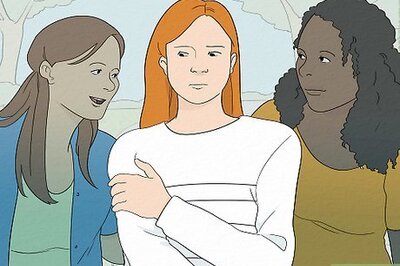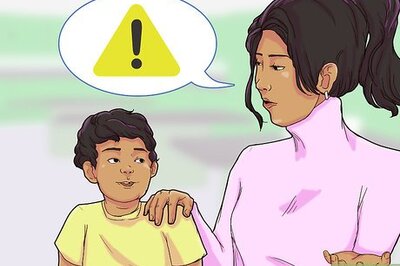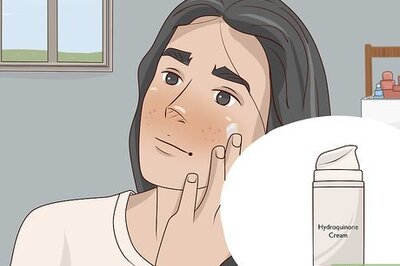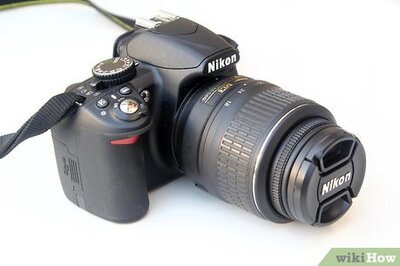
views
Witty Banter Definition & Examples
Witty banter refers to lively and amusing conversation, as often seen in flirty interactions. As a conversational technique, witty banter encompasses clever comebacks, zingy one-liners, and teasing exchanges that build rapport quickly. Witty banter can deepen connections, build intimacy, and create more engaging conversations. While it’s often used to build a flirty atmosphere, witty banter can help to break the ice and add humor to any situation, whether between friends, colleagues, or romantic interests. Witty banter can be used both in-person and over text, but it’s more effective in person as it’s easier to play off the other person’s tone and energy. Keep in mind that while witty banter often includes lighthearted jokes about the other person, it’s never meant to be insulting. As a phrase, the term “witty banter” combines the word “banter,” which refers to teasing or joking talk, with the word “witty,” or something that is amusing in a clever way.
Examples of witty banter often include a clever and teasing turn of phrase. For example, someone may offer a clever comeback or a humorous observation in response to what their conversation partner has said. While often teasing, witty banter should never be used with the intent to hurt someone’s feelings—the goal is to make them laugh and show off your wit without being annoying or belittling. Here are some examples of witty banter: If someone says they’re really good at cooking, you might respond, “Oh, so what gourmet meal are you whipping up for our first date, then?” If someone mentions that they’re terrible at remembering faces, you might respond, “Oh, don't worry, a beautiful mug like mine will be pretty hard to forget.” You might hear someone use the phrase “witty banter” itself in a statement like “No time for witty banter, then.” This expression is common, particularly amongst English speakers in the U.K., and it means that you’re in a serious or hurried situation and don’t have time for humorous small talk.
Types of Witty Banter & How to Use Them
Playful teasing Playful teasing is one of the hallmarks of witty banter, and it involves making gentle jabs or remarks about another person in order to start a flirty back-and-forth. The goal is to make the other person laugh and up the energy of the conversation. If someone says they love to sing, for example, you might challenge them to a karaoke duet. Be careful not to cross the line into “negging” or flirting with someone by way of insults. Make sure that your remarks aren’t mean-spirited in any way and remain fun and respectful.
Clever comebacks A clever comeback is a quick-witted response to a remark or question made by someone else. The purpose of making a clever comeback is to show off your quick thinking and wit, as well as to keep the conversation moving in an energetic and humorous way. If someone asks if you believe in magic, for example, you might say, “Why? Are you already under my spell?” Clever comebacks can sometimes be used to roast or insult someone else—in the context of witty banter, stay away from these types of remarks.
Humorous observations Making a funny observation about yourself, someone else, or the situation you’re both in is a great way to show off your sense of humor and lighten the mood. Observational comedy can also be helpful to turn any dull or mundane situation into a fun and exciting moment. If you’re stuck in traffic together, for example, you might say, “It's funny how they call it rush hour when nothing is moving. What’s that all about?”
Callback humor Callback humor means that you’re referring back to something that was said or happened earlier on in your time together, so it needs to be relevant to a previous conversation or occasion. This type of humor is a great way to show you’re invested in the other person and also helps you build intimacy and rapport through inside jokes. For example, let’s say that your friend or date recently mentioned that they hate when people say “expresso” instead of “espresso.” If you invite them to a coffee later, you might ask them if they want an “expresso” and teasingly enunciate the “ex.” When using callback humor as a form of witty banter, make sure it’s relevant and timely. If too much time has passed since the moment you’re calling back to, your banter may fall flat. Also, avoid bringing up past moments that are potentially embarrassing or sensitive for your conversation partner.
Self-deprecating humor This type of humor involves lighthearted and witty comments about yourself, usually at your own expense. Being self-deprecating can show that you’re self-aware about your own quirks and don’t take yourself too seriously. If you spill some food or drink on yourself, for example, you might say, “You know, I’ve been considering buying a bib, but I somehow thought I could get through life without one. Guess I was wrong.” Be careful of using too much self-deprecating humor, which may make you come off as having low self-esteem.
How to Get Better at Witty Banter
Watch comedy movies, TV shows, and stand-up routines. Spend time studying popular films and television programs known for fast-paced, comedic dialogue (e.g., Gilmore Girls, The Princess Bride, Seinfeld, etc.). Alternatively, watch online comedy routines from witty comedians like Ali Wong, John Mulaney, and Eddie Murphy. By watching and taking in quick-witted dialogue and jokes, you’ll be able to recognize more opportunities to make your own banter and improve your comedic timing.
Educate yourself on pop culture knowledge and topics. Lots of witty banter features references to pop culture moments or famous individuals. Spend some time building up a base of knowledge in general trivia and pop culture events so you can quickly pull those references into your banter. Watch more news and trend reports, read interesting books, attend seminars, try a new social hobby, and travel as much as you can. For example, let’s say you show up to a party that your crush is at. A witty opening line to speak to them could be something like “Of all the gin joints in all the world…” This quote comes from the film Casablanca and is a way to acknowledge that you didn’t expect to see your crush at that party. A quote or reference like this makes you seem more witty, cultured, and interesting than you would if you just said, “Hey.”
Practice your witty banter with people who aren’t in your social circle. Before trying your banter on people whose opinions you care about, start with people who can’t talk back—aka people on shows, movies, and newscasts. When you have some free time, turn on some form of entertainment. As the people in the program or film are talking, pause or mute the video after each of their statements and see if you can come up with a witty remark. The more you practice your witty banter in private, the better you’ll be when you try to engage in witty banter with the people you meet in real life. If you’re feeling more daring, sign up for an improv class! A class like this will give you an opportunity to practice your witty jokes in a safe space before bringing them out into the real world.
Look for unique associations you can make between different subjects. One of the most advanced but most effective ways to improve your wit is to surprise people with unexpected connections between unrelated topics. Making these connections requires quick thinking, but a successful remark can make you seem extremely creative and humorous. Practice this association skill by grabbing a pen and paper and setting a 1-minute timer. Look around at your surroundings and fixate on any object that catches your eye. Quickly down all the possible things that this object reminds you of. For example, a guitar could remind you of music lessons, camping trips, concerts, and more. As a real-life example, former U.S. president Barack Obama once made an unexpected joke connecting the complexities of government agencies to…smoked salmon. By creating a connection between two completely unrelated subjects, Obama showed off his quick wit and succeeded in eliciting a laugh from his audience. In his speech, Obama joked, “12 different agencies deal with exports. There are at least 5 different agencies that deal with housing policy. Then there’s my favorite example. The Interior Department is in charge of salmon in freshwater, but the Commerce Department handles them when they’re in saltwater. I hear it gets even more complicated once they’re smoked.”
Use calming techniques to shake off your nerves and hype yourself up. If you’re putting a lot of pressure on yourself to be witty before a social event or date, your nerves will make it even more difficult to be your full, dynamic self. Before heading out, try some of these relaxation tricks to calm yourself down and build your confidence: Set a 5-minute timer. Take long, slow inhales through your nose while counting to 10, then slowly exhale through your nose for 10 seconds. Repeat until the timer goes off. Wiggle your arms and legs for a few minutes to release your nervous energy. Make a series of funny faces in the mirror. Loosen your mouth and trill your lips together like horse nickering to loosen yourself up. Repeat some tongue twisters and make some goofy “ahh” and “ooh” sounds to warm up your voice and feel more playful. Put on your favorite “pump up” song and sing and dance along for the song’s duration. Try not to put too much pressure on yourself—whatever you’re heading into is just one social interaction, and other people are probably just as nervous and hopeful to come off well as you are.
Keep your body language open and your tone friendly. Tone and body language make the difference between a witty joke and an awkward comment. When teasing someone in a witty way, smirk slightly, raise an eyebrow, and cock your head to communicate that you’re just playing around. Speak in a playful, lilting tone and laugh as much as possible. If, on the other hand, you were to speak in a low tone and stand with a stiff, closed-off posture, your witty banter may be perceived as rude or off-putting.
Add a splash of sarcasm to your conversational humor. Sarcasm plays an important role in witty banter and often makes for an easy fallback when looking for a clever way to tease someone or infuse humor into a situation. Try asking obvious questions or making an obvious statement to humorous effect. If someone told you that they grew up in New York City, for example, you could make a sarcastic joke like, “Well, that must have been dull for you. How’d you ever manage to entertain yourself?” Be careful to stay away from hurtful sarcasm that comes off as condescending or mean-spirited.
Stay present and engaged in the conversation. While easier said than done, one of the most important factors in pulling off witty banter is to be relaxed and let the conversation flow naturally. Your witty banter probably won’t have the effect you want it to if you’re forcing it or not showing your genuine personality. Ever notice how the best conversations are ones where you’re just cracking constant jokes and don’t even have time to think about what you’re saying next? These memorable chats happen because you’re comfortable and letting your true self show. If you need help staying present, try to focus on what’s in your immediate surroundings and do a quick sensory scan. What does your setting look like? What’s the temperature? What color are the walls? What do you see, hear, taste, and touch?
How to Use Witty Banter to Flirt
Witty banter is a great way to flirt and show off your humor if done correctly. Almost everyone likes a romantic partner who makes them laugh, and witty banter can show off your wit as well as create a more dynamic conversation between you and your romantic interest. Follow these tips to master the art of flirtatious witty banter: Keep your body language casual and fun—smile, wink, and grin often. Less is more—avoid overdoing your banter or forcing it when it’s not natural. Try not to overthink—being too in your head can make it difficult to come up with replies. Stick to playful teasing—avoid negging or making intentionally rude remarks to your date. Accept a taste of your own medicine—don’t tease someone else if you can’t handle being teased in return!
How to Use Witty Banter Over Text
When texting, use emojis like the ???? or ???? to augment or clarify your witty banter. Without the help of tone, body language, and facial expressions, witty banter may come across as mean-spirited or confusing over text. Add an emoji to your witty banter so that the recipient of your message better understands what you’re trying to say. For example, let’s say that the last time you hung out with someone, they were in charge of directions and got you lost. When making new plans together, you might say, “I don’t know if I trust you as my copilot after our last disaster.” Written as-is, this statement could be interpreted as rude. If you add a flirty or silly emoji like the tongue-out smiley face or winky face, it’ll be clear that you’re playfully teasing and engaging in witty banter.
How to Respond to Witty Banter
The best way to respond to witty banter is to play along with the joke. Ideally, you can craft a clever comeback to keep the witty banter going. If you’re not sure how to respond, however, it’s okay to just laugh along to whatever the other person is saying. However, it’s okay to react naturally if someone’s banter has crossed the line into being offensive or insulting. If you can tell that’s not their intent, you might laugh it off a few times before letting them know that you’re not comfortable with their teasing.
Key Takeaways: The Do’s & Don’ts of Witty Banter
Do’s: Practice your wit and humor to continue improving it. Use what you know about the other person to make your banter more personalized. Read the room first—make sure both parties are in a relaxed and comfortable mood. Initiate banter as often as you can to keep the conversation interesting. Get a little naughty if the situation is appropriate.
Don’ts: Use banter to insult or belittle someone else—i.e., joking about their insecurities or making backhanded compliments. Banter about controversial topics like race, sexuality, stereotypes, or politics. Force witty banter if it’s not coming naturally. Use banter to avoid serious conversations. Overdo your banter to the point where you seem insincere or annoying. Use offensive or inappropriate humor. Banter with strangers who might not feel comfortable with you yet.




















Comments
0 comment